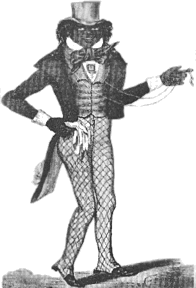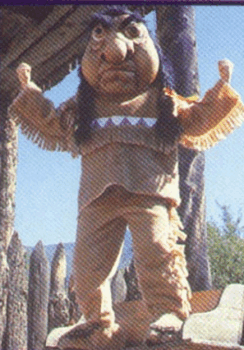I love your blog and have been a sporadic reader for over 3 years. However, I must take issue with this highly misguided claim. I do understand your point, and why you chose to make it in this way; but it's just so problematic.
1) It's wrong.
EVERY. SINGLE. HALLOWEEN. (and even in between Halloweens) There's some story of some morons dressing up in blackface and thinking it's cool. In one university incident from just earlier this year, the guys in blackface actually won a costume contest (showing that everyone at the party thought it was acceptable & not just the morons in the racist costumes). And about Asians? Well, the "Sexy Geisha/Chinadoll" costume trend that just WILL. NOT. DIE. begs to differ. Not to mention, the appropriation that is inherent in "Oriental" style clothes, which first gained popularity during the height of US "involvement" in SE Asia.
2) There is a flaw in your logic.
Dressing up as an Indian, Black, or Asian person is racist. But, obviously, given my examples above, it's not to the exclusion of other races. That definition leaves a lot of room for hipster racists to claim that they're not racist because they "pick on all races equally." Personally, I would contend that it's not so much the "picking on one race to the exclusion of others" so much as the institutionalized power differential that's the root of racism.
In conclusion, I don't take issue with the fact that you may not know very much about how racism manifests itself to the Black or Asian communities because we each have our areas of focus; and we can't possibly know everything about everything. However, I would venture to say that if you are not, in fact, very familiar with these other communities, perhaps using the "Oppression Olympics" as a rhetorical device to make your point is (in addition to being factually incorrect) insensitive and counterproductive.
I feel that this post ("One Woman's Costume Is Another Woman's Nightmare") at Change.org does a much better job at focusing on the horrific legacy of violence against Native women while also acknowledging how it parallels the struggles of many other women of color.
http://womensrights.change.org/blog/view/one_womans_costume_is_another_womans_nightmare
Did you see my Kathy Griffin posting on Racialicious, Liriel? Did you notice that I contribute several articles to that site each week? Rest assured that I saw the Change.org article. I read articles on non-Native racial issues every day and am reasonably well-informed on them.
I wasn't talking about Halloween, which I'm sure is a perennial problem for every minority. Or college frat parties, which generally aren't intended for public consumption. I was talking about public displays of "colorface" like Kathy Griffin's. On TV shows or stage shows, at concerts or parties, at rallies or parades, etc.
I know about Rosie O'Donnell and Miley Cyrus mocking Asians. And no doubt celebrities and others dress up in fashions inspired by geishas or China dolls. But dressing up in blackface? I must've missed all the times where people pretended to be black in public (not in private parties). Feel free to shed light on this subject for us.
Rob is "wrong"?!
I've must've said that prejudice against Indians is one of America's last forms of socially acceptable racism hundreds of times. As evidence, I point to the tens of thousands of mascots, logos, and products featuring Indians as primitive people of the past. So don't think this is some unfortunate misstep in my otherwise impeccable record. <g> It isn't.
I'm not trying to win the Oppression Olympics. It's obvious racism continues against every ethnic group, and probably in proportion to its population. Latinos are America's largest minority, so I imagine they endure the most racism and stereotyping overall.
But Kathy Griffin is an example of something specific. Namely, an outdated stereotype of the past persisting in the present. Do you really think Uncle Toms and mammies, or coolies and geishas, are as common as Indian chiefs and warriors and princesses?
In this particular case, I'm pretty sure I'm right. I suspect outdated Indian images outnumber outdated images of other minorities, and I suspect it's not even close. So until you prove me wrong, I'm not "wrong."
Blackface as common as redface?
No one can say they're immune from criticism because someone, somewhere, is dressing up as a black, Latino, Asian, or Indian stereotype. The question is how often these things occur and how socially acceptable they are. I haven't seen Kathy Griffin, Rachel Zoe, Paris Hilton, Khloe Kardashian, Kesha, et al. dressing up as other minorities recently. Have you?
For every blackface frat party you could find, I probably could find a redface frat party. Plus a sporting event, a Thanksgiving pageant, a Indian Guide type of group, a Broadway play, a parade, a comedy skit, a TV commercial, and on and on. Where are the black or Asian equivalents of these? Go ahead and list them so we're on the same page.
In the last week we've heard about these events:
"Firewater Friday" at University of Washington
"The Squaw's Appeal" in Belle magazine
Miami fan in headdress thrown out
Where was the example of blackface at a major sporting event or on a mainstream magazine cover? Until you show us the evidence...no, my logic isn't flawed. Dressing up in blackface or yellowface is a niche activity conducted primarily by young hipsters. In contrast, dressing up in redface--as an Indian chief or warrior--is totally mainstream. Go to a sporting event with an Indian mascot and you may see dozens of people of every type pretending to be Indians.
Gold medal isn't goal
Nevertheless, I didn't make my comment about blacks and Asians to win the "Oppression Olympics." It was my attempt to raise awareness of the little-known problems facing Indians. To put them on the same footing as the better-known problems facing blacks and other minorities. I.e., "if you think blacks have it bad, check out what Indians have to endure."
For that reason...yes, I occasionally use comparisons as a rhetorical device. But my goal is to end racism and stereotyping against everyone. I'm merely using Indians as example--a prism through which to examine America's cultural mindset.
I'm not saying Indians should "win," I'm saying the problem is worse than most people realize. Americans have become somewhat sensitive to racism against blacks, but they're still insensitive to other forms of bigotry. Which is why I sometimes address issues such as illegal immigration, gay marriage, and the "Ground Zero mosque." As I've said before, I think all bigotries are similar.
I didn't devote several postings to Islamophobia recently because I think Muslims have it worst. I did it because their problems echo the problems of other US minorities. What one minority faces illuminates what every minority faces.
Okay?
For more on the subject, see Stereotyping Is Irrational but Normal? and Why Minstrel Shows Are Wrong.
Below: Two images of 19th-century minorities. What's the key difference? One image actually is from the 19th century, while the other is from the 21st century.



I agree with your response. There are currently "popular" businesses ("Eskimo Joes" in Stillwater, OK) and products that use native iconography, symbols and other cultural native items and if you consider Indian sweats ceremonial, these too are subject to non-native use for entertainment or profitable purposes.
ReplyDeleteEveryone from the US military to private industry uses tribal names, Indian chiefs and derogatory words like "squaw" for self indulgance and sport.
Too bad the NAACP is not as vocal about native mascots as it is when a cop makes racial remarks towards our African American brethren?
Hi Rob,
ReplyDeleteYour website is interesting.
I'm not sure of why the frequency of redface or blackface is even up for debate. Why does it matter?? Doesn't it simply matter that both happen and both need to be stopped? Isn't that a common enemy being fought? Time is wasted, imho, debating "who gets it more".
@Burt, the NAACP has more than enough to deal with trying to address the needs of "Colored People". While hipsters today have reverted back to the racist term "people of color" and have managed to umbrella anyone with pigment under the term, the organization itself was founded by and for the advancement of Black people (with the assistance of some Jewish founders, who were in a similar boat as African-Americans at the time, at least, and had strong ties to the African-American community).
Just as Ghandi (an East Indian) stood up specifically for the advancement of his people and was praised for it, while ignoring the plight of Native South Africans who were being brutalized under equally oppresive or worse laws in the same country as his East Indian brethren...the same goes for the NAACP.
If we want organizations to represent both African-American and Native American (or both) rights, then we need to form one ourselves and make that its mission.
Not expect other organizations to fight our battles. No one expected Ghandi to do so.
Kait: Thanks for pointing out the obvious that many people miss... that "people of color" is just another way to say "colored people", just as "people of Indonesia" is another way to say "Indonesian".
ReplyDeleteIt is best to call Gandhi an Indian Indian instead of East Indian.
He was from India, not from the East Indies.
It should also be pointed out that the NAACP favors blatantly racist policies: pushing for African-Americans to get preferential treatment in job hiring and promotion while kicking members of other races to the back of the bus in such considerations: instead of pushing for equal treatment.
That was my whole point Dmarks about the NAACP, at least you caught that!
ReplyDeleteAnd does this mean that in keeping the word "colored" in the NAACP, they still accept being called "colored" people? Why the double standard? I mean, blacks still call each other the N word and even seem proud of it, but the rest of the planet is held under hostage verbally.
I also do not accept that " the NAACP has more than enough to deal with trying to address the needs of "Colored People". If the NAACP does not address poverty in all races, whats the point? Who do natives call when there is injustice and corruption? Ghostbusters or 911?
And (NAACP)busy addressing what needs? Do African Americans still have an understanding of their roots and their plight? Or has it all come down to simply being a successful capitalist with bling?
Burt asked: "And does this mean that in keeping the word "colored" in the NAACP"
ReplyDeleteI have no issue with that, just as I have no issue with the United Negro College Fund or the ARC (Association for Retarded Citizens), "legacy" names not kept for oppressive reasons. Just like all the officially named Sioux tribes which might not be called Sioux anymore if they got around to changing the official names.
I'm really asking a question here because growing up, the N word was a bad word around my house, but it seemed acceptable in the community and even in school.
ReplyDeleteI can say that I have experienced racism from African Americans in the army back in the 80's, but it was isolated and more of my friends were from all walks of life.
I just wonder if some black peoples are insulted at associating themselves with both words, African and American since both nations at some point in history have "distinct" themselves apart from African Americans here?